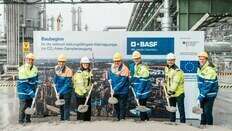- BASF's heat pump project at Ludwigshafen aims to reduce CO2 emissions by 100,000 metric tons annually.
- The heat pump will have a thermal output of just under 50 megawatts and use renewable electricity.
- Commissioning is scheduled for mid-2027, with the German government contributing up to €310 million.
- The heat pump will primarily produce steam for formic acid production, using waste heat from steam crackers.

Project Overview
BASF, in partnership with GIG Karasek, has initiated the construction of one of the world's largest industrial heat pumps at its Ludwigshafen site. This project aims to generate CO2-free steam, significantly reducing greenhouse gas emissions by up to 100,000 metric tons annually.
Technical Details
The heat pump will have a thermal output of just under 50 megawatts and will utilize electricity from renewable sources. It will primarily produce steam for formic acid production, leveraging waste heat from cooling processes in one of the site's steam crackers.
Timeline and Investment
Commissioning of the heat pump is scheduled for mid-2027. The German Federal Ministry for Economic Affairs and Energy supports the project with up to €310 million in funding as part of the Carbon Contracts for Difference program.
Infrastructure and Capacity
The heat pump will cover an area of approximately 2,000 square meters and connect to the plant via pipe bridges. It is designed to produce up to 60 metric tons of steam per hour, setting new standards in temperature lift and capacity.

